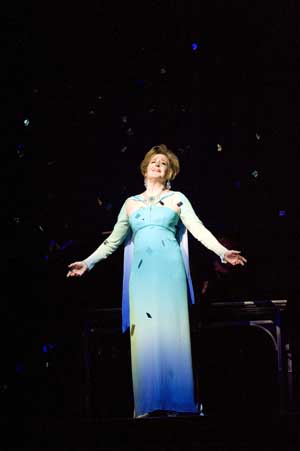
Mommy Dearest all over again
Any study in narcissism ought to be way up there in terms of social relevance for any culture. Watching out for oneself is a necessary component of survival. But since the ’70s and the pop-psych era of Me-ism, it seems as if Americans have gotten increasingly obsessed with their needs and their right to have them fulfilled when and as they desire.
Theater, with its idolized and idealized actors on a brightly lit stage—the audience separate, bathed in shadow, and unable to participate except through response—has always been a living crucible for the creation of the adored self. But to be successful, and by that I mean emotionally logical and revelatory to the audience, which is the only real success in theater, a play or opera has reveal the true flaws or strengths in its central characters and examine their transformative nature.
Strangely, in Jake Heggie’s new opera, Three Decembers, with libretto by Gene Sheer, narcissism is offered as the central flaw only in the character of Broadway diva Madeline Mitchell. Maddy is also the only character who recognizes her own narcissism and is vaguely troubled by it. At one point she gasps over the Christmas letter she is writing to her children and wonders, How did this letter turn out to be all about me?
Maddy’s two adult children, the highly privileged and discontented Beatrice and Charlie, are far more oblivious to their own narcissism and spend much of their time on stage competing for their mother’s position as central diva or maligning her inability to spend her time mothering them—which means putting them front and center in her attention. As the true narcissists of the opera, they are never recognized as such and are presented instead as the abused and righteous victims of Maddy’s narcissism. And that is the central flaw of this opera.
There is only one scene in which the battle for center stage disappears, and that’s in Charlie’s meditation on his partner’s death from AIDS;that is perhaps why that aria attains an aura of real sympathy and genuine pain.
The opera was adapted from an original 14-page play by Terrence McNally, Some Christmas Letters (and a Couple of Phone Calls), that was performed only once for an AIDS benefit in New York. When the creative team began adapting the play for an opera, McNally wanted to make the story more complicated, increasing the number of characters, among other things, and perhaps that would have saved the opera from its current simplistic ideas. Certainly much of his wonderful language remains in the libretto, which adds luster to the music.
There is so much about this opera that should have made it sensational. Frederika von Stade, with her golden tones and stunning stage presence as Maddy; Keith Fares with his emotionally deep and vibrant baritone as Charlie; Kristin Clayton, with her fine soprano and compelling personality as Bea; Jake Hegge’s musical settings of the lyrics, especially in the ensemble pieces. Excellent musicians and just general all-around great production.
Why, o why, then, did this piece end up seeming staggeringly clichéd, and in its last moments—yes, I’m going to say it—just plain hokey?
—Jaime Robles
